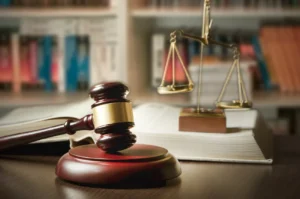 Texas is an at-fault state for car accident cases. Accident victims can seek compensation for damages by filing a personal injury claim against the responsible driver. However, they must prove the other party caused the accident before they can receive money for their medical expenses, property damage, lost wages, pain, and suffering.
Texas is an at-fault state for car accident cases. Accident victims can seek compensation for damages by filing a personal injury claim against the responsible driver. However, they must prove the other party caused the accident before they can receive money for their medical expenses, property damage, lost wages, pain, and suffering.
Drivers must have minimum amounts of liability insurance coverage. Most personal injury cases begin by filing an insurance claim. Liability insurance compensates victims of an auto accident that is the insured’s fault.
However, the insurance company for the at-fault driver might blame you for causing the car accident. Even if you were not at fault, the company has the incentive to shift blame to you because shifting blame could reduce the money you receive for a personal injury lawsuit.
If you’re being blamed for an accident, you need legal advice from an experienced Austin personal injury lawyer. An attorney can help you fight unjust allegations of fault by an insurance company trying to avoid paying your claim or reduce the value of your claim.
What Is the Comparative Fault Standard in Texas for Car Accidents in Austin?
 Comparative fault is a legal standard in personal injury law for apportioning damages. It is used in all types of personal injury cases, including truck accidents, motorcycle crashes, car accidents, pedestrian accidents, and bicycle accidents. Each party responsible for causing the accident shares liability for damages caused by the accident.
Comparative fault is a legal standard in personal injury law for apportioning damages. It is used in all types of personal injury cases, including truck accidents, motorcycle crashes, car accidents, pedestrian accidents, and bicycle accidents. Each party responsible for causing the accident shares liability for damages caused by the accident.
When a person is partially at fault for causing an accident in Austin, their damages can be reduced. In four states and the District of Columbia, contributory negligence laws bar accident victims from recovering compensation if they have any liability for the accident. Being 1% at fault could result in a denial of your personal injury claim.
Other states have a pure comparative fault standard. The accident victim could be 99% to blame and still file a personal injury claim to receive damages.
Texas and other states adopted a modified comparative fault law, which is the most common standard found in the country. There are two versions of modified comparative fault. In one, accident victims cannot recover compensation if they are 50% or more at fault; and in the other, they are barred from financial recovery if they are 51% or more to blame.
Texas follows the 51% recovery bar version of modified comparative fault. Texas proportionate responsibility law bars a person injured in an accident from recovering damages if they are 51% or more to blame for causing the crash. Therefore, if a jury decides you were 55% to blame for causing a rear-end accident, you will not receive money for your damages.
However, let’s suppose the jury decides you were 25% to blame for the car crash because you were speeding. The jury awards you $400,000 in damages. Under Texas contributory fault laws, you would receive $300,000 (the total damages award less 25% for fault).
Shifting the blame to the accident victim can significantly reduce the amount of money the insurance company must pay for your claim. Therefore, the company is incentivized to blame you for causing the crash.
Beware of Insurance Tactics Used To Blame the Accident Victim in Texas
The insurance company investigates the car crash. First, it looks for evidence that could imply fault.
For example, you said you were sorry the accident happened at the accident scene. The company accuses you of accepting fault for the crash. You would not be “sorry” for the accident unless you had some fault for causing the collision.
Another common strategy the insurance company uses is the interview. An insurance adjuster calls you to discuss your claim. During the conversation, the adjuster asks you to describe your day before and after the accident.
Suppose you tell the claims adjuster that you woke up late and had to rush to get to work on time. The fact that you work up late has nothing to do with the cause of the accident. However, the insurance company claims that you were speeding or distracted while driving to work because you were rushing.
Questions the insurance adjuster asks might appear to be polite conversation. However, the adjuster is trained to ask questions that could lead to statements that can be misinterpreted to shift blame for the accident to you.
Therefore, it is best to let an Austin personal injury lawyer handle all communications with the insurance company. Avoid talking to the company until you meet with an attorney to discuss your case.
Also, do not agree to provide a written or recorded statement. It is wise to remember that insurance companies often record their telephone calls. Therefore, always ask if your conversation is being recorded before talking to an insurance company.
Why Is It Important To Fight Against Claims of Contributory Fault After an Austin Accident?
Automobile accidents and other personal injury incidents often cause traumatic and catastrophic injuries. The damages can be substantial and include future losses. The amount of time it takes to recover from an accident could be lengthy, which increases the damages.
Compensation for the total damages is crucial because you need those funds. The types of damages you can receive for a car accident claim include economic and non-economic damages. Examples of damages include:
- Medical bills
- Impairments, disabilities, scarring, and disfigurement
- Loss of income, including wages, benefits, salaries, bonuses, and future earning capacity
- Emotional distress and mental anguish
- Property damages
- Cost of physical, occupational, and rehabilitative therapies
- Loss of quality of life and enjoyment of life
- Physical pain and suffering
- Out-of-pocket expenses
- Cost of ongoing medical treatment and long-term care
In addition to compensatory damages, some car accident victims receive punitive damages. These damages do not compensate the accident victim.
Instead, punitive damages are awarded against the at-fault party for gross negligence, fraud, or malice. The punitive damages are paid to the accident victim and can be reduced by contributory fault.
How Can an Austin Accident Lawyer Help if You’re Blamed for Causing a Car Accident?
An attorney understands how insurance companies treat accident victims. They know the lengths the companies will take to avoid paying the full value of a personal injury claim. Therefore, an attorney can help you avoid making a mistake that could lead to allegations of contributory fault.
Your lawyer also investigates the car accident to gather evidence proving causation and fault. The attorney bases the case on solid evidence proving that the other driver caused the crash. Evidence could include:
- Copies of accident reports
- Statements made by the drivers and passengers
- Photographs of the accident scene
- Videos of the collision captured by surveillance cameras and traffic cameras
- Opinions and reports by expert witnesses, including accident reconstructionists and engineers
- Evidence collected from vehicle data recorders
- Testimony from eyewitnesses
Each case is unique. Therefore, there could be additional evidence in your case. An experienced Austin personal injury lawyer fights the insurance company to protect your legal rights and interests.
Schedule a Free Consultation With an Austin Personal Injury Attorney
It’s important to understand your legal options if you’re being blamed for an accident in Austin, Texas. Contact the lawyers at FVF law by calling (512) 982-9328 to schedule a free consultation with an experienced injury lawyer in Austin. We’d be more than happy to sit down and speak with you about your case in a no-pressure environment. We can also provide helpful legal advice and assistance at that time.